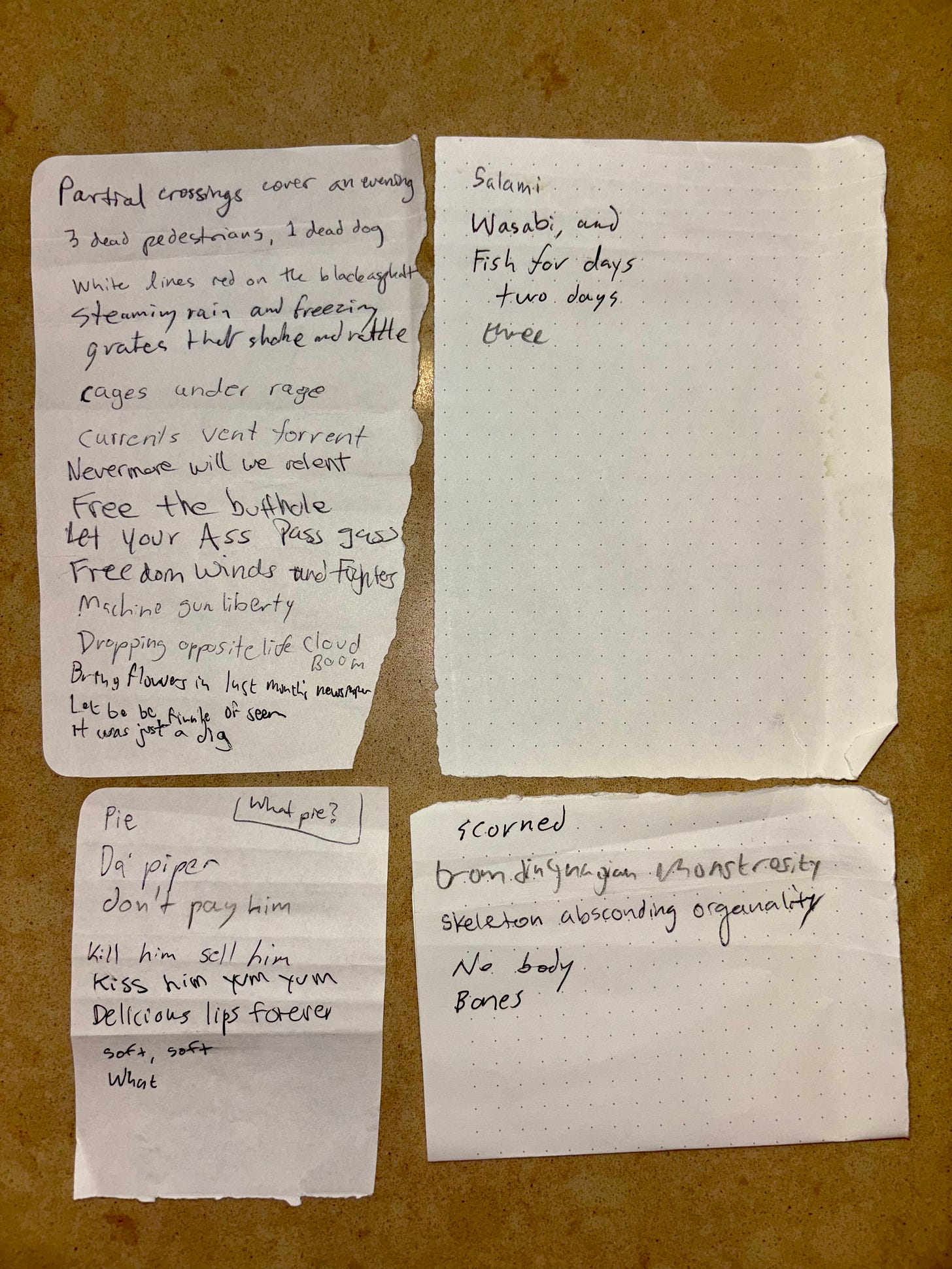ZOMBIE POEMS (November 2024)
1. Stale crackers taste awfully dry like ashes of bones long days of nights spring, midnight fall, midday asleep 2. Succulent temple of fear and loathing joins us each day to give thanks and lament me 3. The time of year has grown indifferent Mildew of summer and deepening snow Cover the experience of yesteryear: The sun passing over. I taste beer On the sidewalk, I have to stop When the city whirs, when the city Stirs and churns and winds Beat swirls, chills and yearns Shivers quiver but learn The crunch of crisp cabbage A sigh of goodnight One might. One might, but will they? 4. A thousand questions unheard, yet shrieking truths float down around the drain slowing approaching understanding
Nothing says party like a good poem!
Seasons greetings! Happy holidays! It’s almost 2025! It has been a bit since I last posted a PotW here, but I’m squeezing in one last one before the year is over. This week, I present a few whimsical poems and a fun writing activity you can try with your holiday homies.
The “zombie poem” is a collaborative writing exercise that derives from the Surrealist “exquisite corpse” game (which is tangentially related to “consequences,” the bar game that eventually led to MadLibs and possibly even to computer generated writing). I love creating “zombie poems” for fun and for getting in a creative spirit—I’ve played this with students in creative writing classes, with friends and family, in serious settings and at very unserious parties. There are different ways of creating a “zombie poem” but here are two methods I’ve enjoyed:
Method 1 (easy):
In a group of three or more:
Distribute a piece of paper and a writing utensil to each person.
Everyone writes two lines. This could be two lines of poetry (like a rhyming couplet, or unrhymed free verse) or two sentences of prose. Write whatever comes to mind (I like to focus on a current feeling or a description of my surroundings). Feel free to punctuate, be silly, or be serious.
After writing two lines, fold your paper so that only one line can be seen.
Once everyone has folded their papers, pass your paper to the right. You should receive a paper that has only one line of writing.
Based on the line you are given, write two more lines to follow it. Try to be associative—build off ideas, sounds, rhymes, feelings, or plots.
Follow steps 3-5: fold, pass, write.
Read your zombie poem to the group!
Method 2 (harder):
In a group of four:
Distribute a piece of paper and a writing utensil to each person.
Write one word.
Pass your paper to the right.
Following the one word you were given, write two words.
After writing two words, fold your paper so that only those two words can be seen and the first word is hidden.
Once everyone has folded their papers, pass your paper to the right.
Following the two words you were given, write three words.
After writing three words, fold your paper so that only those three words can be seen and the first word is hidden.
Once everyone has folded their papers, pass your paper to the right.
Following the three words you were given, write two words.
After writing two words, fold your paper so that only those two words can be seen and the first word is hidden.
Once everyone has folded their papers, pass your paper to the right.
You should receive the paper you started with. Write one last word to finish the poem.
Read your zombie poem to the group!
*This is an example of a group of 4. Any number more than 4 works for this method, just follow a pyramid shape. For a group of 6, the final poem should have this many words in each line: 1-2-3-4-3-2-1.
In essence, you are passing around a paper and adding your writing to it while only seeing one part at a time. By doing this, you are adding to an “exquisite corpse” body part by body part until something alive is created—a zombie!
There are plenty of variations, extra rules, or constraints you can add to your zombie poem. Have fun with it! Here are some ideas to consider once you get the hang of it:
Keep passing the paper until the entire page is filled with writing.
When reading a poem, always start by reading its title; a fun way to create a title is to put together the first word and the last word of the poem.
Decide on a theme before you start.
Randomize the amount of times you pass between each step of writing so that you don’t know who you will build off of.
When you get to the last line, or whenever you decide to stop, open up the entire page and read everything before writing the final line or word. This can help to make the poem more cohesive.
Type up what you wrote together, feeling free to edit and punctuate and change as you desire.
Alone? You can try this on your own: write two lines, fold to only show one, do something else until you can’t remember precisely what you wrote, add two more lines, and repeat!
If you end up writing any fun zombie poems, post them in the comments!
Thanks for reading! I hope you find some time in the coming days to relax, reflect, laugh, write, restore, and revitalize. If you’re feeling buried, rise up from the dirt like a zombie and go find some brains! If you’re alive and well, lend a hand and lift someone up to your level.
Peace and poetry, Ricky



